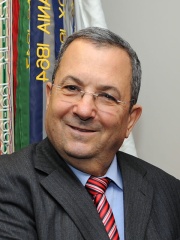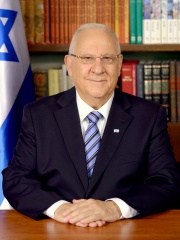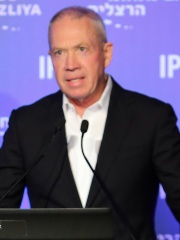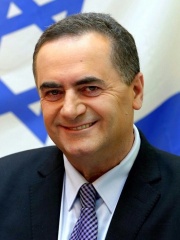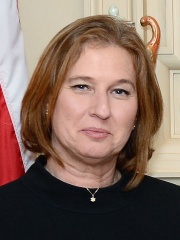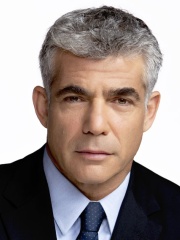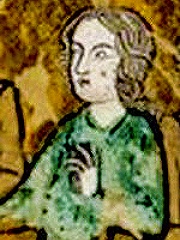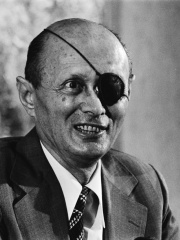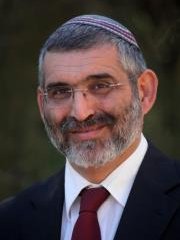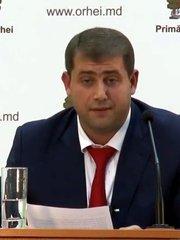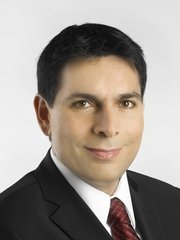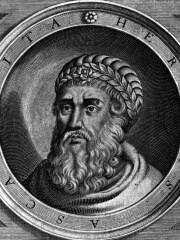
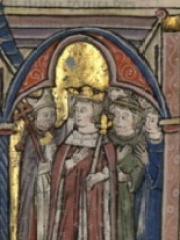
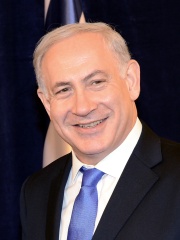

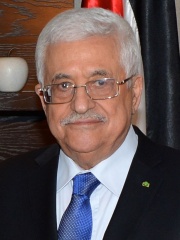

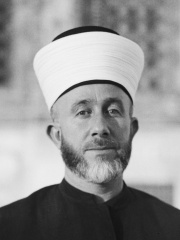
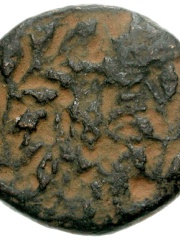
The Most Famous
POLITICIANS from Israel
This page contains a list of the greatest Israeli Politicians. The pantheon dataset contains 19,576 Politicians, 129 of which were born in Israel. This makes Israel the birth place of the 29th most number of Politicians behind Portugal, and Switzerland.
Top 10
The following people are considered by Pantheon to be the top 10 most legendary Israeli Politicians of all time. This list of famous Israeli Politicians is sorted by HPI (Historical Popularity Index), a metric that aggregates information on a biography's online popularity. Visit the rankings page to view the entire list of Israeli Politicians.

1. Herod the Great (73 BC - 3 BC)
With an HPI of 84.23, Herod the Great is the most famous Israeli Politician. His biography has been translated into 71 different languages on wikipedia.
Herod I or Herod the Great (c. 72 – c. 4 BCE) was a Roman Jewish client king of the Herodian kingdom of Judea. He is known for his colossal building projects. Among these works are the rebuilding of the Second Temple in Jerusalem and the expansion of its base—the Western Wall being part of it. Many of the crucial details of his life are recorded in the works of the 1st century CE Roman–Jewish historian Josephus. Despite Herod's successes, including forging a new aristocracy, he has been criticized by various historians. His reign polarizes historians’ opinions, some viewing his legacy as evidence of success, and some viewing it as evidence of tyranny. Herod the Great is described in the Christian Bible as the coordinator of the Massacre of the Innocents. Most of the New Testament references are to his son Herod Antipas (such as the events leading to the executions of John the Baptist and Jesus of Nazareth in Matthew 14), or his grandson Herod Agrippa (in Acts 12). Upon Herod's death in 4 BCE, the Romans divided his kingdom among three of his sons and his sister: his son Herod Antipas received the tetrarchy of Galilee and Peraea. Other family members of Herod the Great include Herod's son Herod Archelaus, who became ethnarch of Judea, Samaria, and Idumea; Herod's son Philip who became tetrarch of territories north and east of the Jordan River; and Herod's sister Salome I, who was given a toparchy including the cities of Jabneh, Ashdod, and Fasayil (Phasaelis).

2. Baldwin IV of Jerusalem (1161 - 1185)
With an HPI of 83.71, Baldwin IV of Jerusalem is the 2nd most famous Israeli Politician. His biography has been translated into 48 different languages.
Baldwin IV (1161–1185), known as the Leper King, was the king of Jerusalem from 1174 until his death in 1185. Baldwin ascended to the throne when he was thirteen despite having leprosy. He launched several attempts to curb the increasing power of the ruler of Egypt, Saladin, though much of his life was marked by infighting amongst the kingdom's nobles. Throughout his reign, and especially at the end of his life, he was troubled by his succession, working to select a suitable heir and prevent a succession crisis. Choosing competent advisers, Baldwin ruled a thriving crusader state, protecting it from Saladin. Baldwin's parents, King Amalric and Agnes of Courtenay, separated when Baldwin was two. At nine years old, he was sent to be educated by Archbishop William of Tyre. William noticed preliminary symptoms of leprosy, but Baldwin was only diagnosed after he succeeded his father as king. Thereafter, his hands and face became increasingly disfigured. He mastered horse riding despite gradually losing sensation in his extremities and fought in battles until his last years. First, Miles of Plancy ruled the kingdom in Baldwin's name, then Count Raymond III of Tripoli took over until the king reached the age of majority in 1176. Baldwin's mother then returned to court, and he became closer to her and her brother, Joscelin. As soon as he assumed government, Baldwin planned an invasion of Egypt, which fell through because of his vassals' uncooperativeness. Leprosy prevented Baldwin from marrying; he hoped to abdicate when his older sister, Sibylla, married William of Montferrat in 1176, but William died the next year. Saladin attacked Baldwin's kingdom in 1177, but the king and the nobleman Raynald of Châtillon repelled him at Montgisard, earning Baldwin fame. In 1180, to forestall a coup by Count Raymond III of Tripoli and Prince Bohemond III of Antioch, Baldwin had Sibylla marry Guy of Lusignan. However, Guy was opposed by a large fraction of the nobility, and soon permanently impaired his relationship with Baldwin through his insubordination. Although Baldwin wished to abdicate, the internal discord that followed forced him to remain on the throne, as only he was capable of uniting the quarreling nobility. Baldwin again repelled Saladin in 1182 at the Battle of Le Forbelet, but leprosy rendered him near-incapable in 1183. After Guy's failure to lead, Baldwin disinherited him and had Sibylla's son, Baldwin V, crowned co-king before travelling in a litter to lift Saladin's Siege of Kerak. Because of their refusal to attend court, Baldwin failed to have Sibylla's marriage to Guy annulled and Guy's fief of Ascalon confiscated. In early 1185, he arranged for Raymond to rule as regent for Sibylla's son, dying of a fever before 16 May 1185. Two years after his death, his realm was destroyed by Saladin at the Battle of Hattin.

3. Benjamin Netanyahu (b. 1949)
With an HPI of 82.66, Benjamin Netanyahu is the 3rd most famous Israeli Politician. His biography has been translated into 125 different languages.
Benjamin "Bibi" Netanyahu (born 21 October 1949) is an Israeli politician and diplomat who has served as Prime Minister of Israel since 2022. Having previously held office from 1996 to 1999 and from 2009 to 2021, Netanyahu is Israel's longest-serving prime minister. Born in Tel Aviv, Netanyahu was raised in West Jerusalem and the United States. He returned to Israel in 1967 to join the Israel Defense Forces and served in the Sayeret Matkal special forces. In 1972, he returned to the US, and after graduating from the Massachusetts Institute of Technology, Netanyahu worked for the Boston Consulting Group. He moved back to Israel in 1978 and founded the Yonatan Netanyahu Anti-Terror Institute. Between 1984 and 1988 Netanyahu was Israel's ambassador to the United Nations. Netanyahu rose to prominence after his election as chair of Likud in 1993, becoming leader of the opposition. In the 1996 general election, Netanyahu became the first Israeli prime minister elected directly by popular vote. Netanyahu was defeated in the 1999 election and entered the private sector. He served as minister of foreign affairs and finance, initiating economic reforms, before resigning over the Gaza disengagement plan. Netanyahu returned to lead Likud in 2005, leading the opposition between 2006 and 2009. After the 2009 legislative election, Netanyahu formed a coalition and became prime minister again. Netanyahu made his closeness to Donald Trump central to his appeal from 2016. During Trump's first presidency, the US recognized Jerusalem as capital of Israel, Israeli sovereignty over the Golan Heights, and brokered the Abraham Accords between Israel and the Arab world. Netanyahu received criticism over expanding Israeli settlements in the occupied West Bank, deemed illegal under international law. In 2019, Netanyahu was indicted on charges of breach of trust, bribery and fraud, and relinquished all ministerial posts except prime minister. The 2018–2022 Israeli political crisis resulted in a rotation agreement between Netanyahu and Benny Gantz. This collapsed in 2020, leading to a 2021 election. In June 2021, Netanyahu was removed from the premiership, before returning after the 2022 election. Netanyahu's premierships have been criticized for perceived democratic backsliding and an alleged shift towards authoritarianism. Netanyahu's coalition pursued judicial reform, which was met with large-scale protests in early 2023. The October 7 attacks by Hamas-led Palestinian groups in the same year triggered the Gaza war, with Netanyahu facing nationwide protests for the security lapse and failure to secure the return of Israeli hostages. In October 2024, he survived an assassination attempt and ordered an invasion of Lebanon with the stated goal of destroying the military capabilities of Hezbollah, a key ally of Hamas. After the fall of the Assad regime in December 2024, Netanyahu directed an invasion of Syria. He also presided over the 2025 Israeli strikes on Iran, which escalated into the Iran–Israel war. Netanyahu's government has been accused of orchestrating the genocide in Gaza, culminating in the South Africa v. Israel case before the International Court of Justice in December 2023. The International Criminal Court (ICC) issued an arrest warrant in November 2024 for Netanyahu for alleged war crimes and crimes against humanity as part of the ICC investigation in Palestine.

4. Ariel Sharon (1928 - 2014)
With an HPI of 80.78, Ariel Sharon is the 4th most famous Israeli Politician. His biography has been translated into 98 different languages.
Ariel Sharon (Hebrew: אֲרִיאֵל שָׁרוֹן [aʁiˈ(ʔ)el ʃaˈʁon] ; also known by his diminutive Arik, אָרִיק; 26 February 1928 – 11 January 2014) was an Israeli general and politician who served as the prime minister of Israel from March 2001 until April 2006. Born in Kfar Malal in Palestine to Russian Jewish immigrants, he rose in the ranks of the Israeli Army from its creation in 1948, participating in the 1948 Palestine war as platoon commander of the Alexandroni Brigade and taking part in several battles. Sharon became an instrumental figure in the creation of Unit 101 and the reprisal operations, including the 1953 Qibya massacre, as well as in the 1956 Suez Crisis, the Six-Day War of 1967, the War of Attrition, and the Yom-Kippur War of 1973. Yitzhak Rabin called Sharon "the greatest field commander in our history". Upon leaving the military, Sharon entered politics, joining the Likud party, and served in a number of ministerial posts in Likud-led governments in 1977–92 and 1996–99. As Minister of Defense, he directed the 1982 Lebanon War. An official enquiry found that he bore "personal responsibility" for the Sabra and Shatila massacre of Palestinian refugees, for which he became known as the "Butcher of Beirut" among Arabs. He was subsequently removed as defense minister. From the 1970s through to the 1990s, Sharon championed construction of Israeli settlements in the Israeli-occupied West Bank and Gaza Strip. He became the leader of the Likud in 1999, and in 2000, amid campaigning for the 2001 prime ministerial election, made a controversial visit to the Al-Aqsa complex on the Temple Mount, triggering the Second Intifada. He subsequently defeated Ehud Barak in the election and served as Israel's prime minister from 2001 to 2006. As Prime Minister, Sharon orchestrated the construction of the Israeli West Bank barrier in 2002–2003 and Israel's unilateral disengagement from the Gaza Strip in 2005. Facing stiff opposition to the latter policy within the Likud, in November 2005 he left Likud to form a new party, Kadima. He had been expected to win the next election and was widely interpreted as planning on "clearing Israel out of most of the West Bank", in a series of unilateral withdrawals. Following a stroke on 4 January 2006, Sharon remained in a permanent vegetative state until his death in 2014. Sharon remains a highly polarizing figure in Middle Eastern history. Israelis almost universally revere Sharon as a war hero and statesman, whereas Palestinians and Human Rights Watch have criticized him as a war criminal, with the latter lamenting that he was never held accountable.
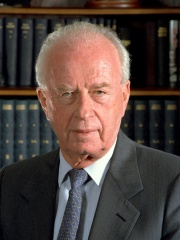
5. Yitzhak Rabin (1922 - 1995)
With an HPI of 80.27, Yitzhak Rabin is the 5th most famous Israeli Politician. His biography has been translated into 96 different languages.
Yitzhak Rabin (; Hebrew: יִצְחָק רַבִּין, IPA: [itsˈχak ˈʁabin]; 1 March 1922 – 4 November 1995) was an Israeli statesman and general who was the prime minister of Israel, having served two terms in office, 1974–1977, and from 1992 until his assassination in 1995. He was the first prime minister to have been born in Palestine. Rabin was born in Jerusalem to Jewish immigrants from Eastern Europe and was raised in a Labor Zionist household. He learned agriculture in school and excelled as a student. As a teenager, he joined the Palmach, the commando force of the Yishuv. He eventually rose through its ranks to become its chief of operations during the 1948 Arab–Israeli War. In late 1948, he joined the newly formed Israel Defense Forces and continued to rise as a promising officer, with a 27-year career as a professional soldier. He ultimately attained the rank of Rav Aluf, the most senior rank in the Israeli Defense Force (often translated as lieutenant general). In the 1950s, Rabin helped shape the training doctrine of the IDF and he led its Operations Directorate from 1959 to 1963. He was appointed chief of the general staff in 1964 and oversaw Israel's victory in the 1967 Six-Day War. Rabin served as Israel's ambassador to the United States from 1968 to 1973, during a period of deepening U.S.–Israel ties. He was appointed Prime Minister of Israel in 1974 after the resignation of Golda Meir. In his first term, Rabin signed the Sinai Interim Agreement and ordered the Entebbe raid. He resigned in 1977 in the wake of a financial scandal. Rabin was Israel's minister of defense for much of the 1980s, including during the outbreak of the First Intifada. In 1992, Rabin was re-elected as prime minister on a platform embracing the Israeli–Palestinian peace process. He signed several historic agreements with the Palestinian leadership as part of the Oslo Accords. In 1994, Rabin won the Nobel Peace Prize together with long-time political rival Shimon Peres and Palestinian leader Yasser Arafat. Rabin also signed a peace treaty with Jordan in 1994. In November 1995, he was assassinated by Yigal Amir, an extremist who opposed the terms of the Oslo Accords. Amir was convicted of Rabin's murder and sentenced to life imprisonment. Rabin was the first native-born prime minister of Israel, the only prime minister to be assassinated, and the second to die in office after Levi Eshkol. Rabin has become a symbol of the Israeli–Palestinian peace process.

6. Mahmoud Abbas (b. 1935)
With an HPI of 79.90, Mahmoud Abbas is the 6th most famous Israeli Politician. His biography has been translated into 84 different languages.
Mahmoud Abbas (Arabic: مَحْمُود عَبَّاس, romanized: Maḥmūd ʿAbbās; born 15 November 1935), also known by the kunya Abu Mazen (Arabic: أَبُو مَازِن, ʾAbū Māzin), is a Palestinian politician who has been serving as the second president of Palestine and the Palestinian National Authority (PNA) since 2005. He has also been the fourth chairman of the Palestine Liberation Organization (PLO) since 2004. Abbas is also a member of the Fatah party and was elected the party's chairman in 2009. Abbas was elected on 9 January 2005 to serve as President of the Palestinian National Authority until 15 January 2009, but extended his term until the next election in 2010, citing the PLO constitution, and on 16 December 2009 was voted into office indefinitely by the PLO Central Council. As a result, Fatah's main rival, Hamas, initially announced that it would not recognize the extension or view Abbas as the rightful president. Nonetheless, Abbas is internationally recognized in his position(s) and Hamas and Fatah conducted numerous negotiations in the following years, leading to an agreement in April 2014 for a Unity Government (which lasted until October 2016) and to the recognition of his office by Hamas. Abbas was chosen to continue serving as president by the PLO Central Council on 23 November 2008. Abbas served as the first prime minister of the Palestinian Authority from March to September 2003. Before being named prime minister, Abbas led the PLO Negotiations Affairs Department. Abbas has been subject to both criticism and controversy, having been accused of corruption, as well as distorting Jewish history and engaging in Holocaust trivialization. Abbas was a key player in negotiations for peace and in talks laying the groundwork for the Israel–Palestine two-state solution.

7. Amalric of Jerusalem (1136 - 1174)
With an HPI of 79.76, Amalric of Jerusalem is the 7th most famous Israeli Politician. His biography has been translated into 40 different languages.
Amalric (French: Amaury; 1136 – 11 July 1174), formerly known in historiography as Amalric I, was the king of Jerusalem from 1163 until his death. His Muslim adversaries described him as the bravest and cleverest of the crusader kings. Amalric was the younger son of King Fulk and Queen Melisende. His elder brother, King Baldwin III, served as their mother's co-ruler. Melisende made Amalric the count of Jaffa, and he took her side in her conflict with Baldwin until Baldwin deposed her in 1152. From 1154 Amalric was fully reconciled with his brother and made count of both Jaffa and Ascalon. In 1157, he married Agnes of Courtenay despite the misgivings of the Church and had two children with her, Sibylla and Baldwin. When his brother died in 1163, Amalric was obliged to leave Agnes in order to be recognized as king. He was crowned on 18 February. Amalric's reign was marked by a ceaseless struggle with the Muslim atabeg of Damascus and Aleppo, Nur al-Din Zengi, and persistent attempts to subjugate Egypt. In his first invasion he induced the vizier, Dirgham, to pay tribute, and in the following two he supported the rival vizier, Shawar, against Dirgham and Nur al-Din's general Shirkuh. Nur al-Din took advantage of the king's expeditions to Egypt to wreak havoc on the kingdom and the northern crusader states, Antioch and Tripoli, and Amalric had to intervene in the north as well. Throughout his reign Amalric sought support of Western European rulers in his struggle against the Muslims of Syria and Egypt, but concluded the most concrete alliance with the Byzantine emperor, Manuel I Komnenos, whose grandniece Maria became Amalric's second wife. They had a daughter, Isabella. In 1167 Amalric again prevented Shirkuh from seizing Egypt and took Alexandria. Without waiting for the Byzantines, and in contravention of his treaty with Shawar, he invaded Egypt in 1167–68 with the intention to conquer it, but it fell to Shirkuh instead. Shirkuh died in 1169, and Amalric launched an invasion in concert with Manuel, but the two armies cooperated poorly and failed in their attempt. Shirkuh's successor, Saladin, emerged as a major threat. Amalric's only son, Baldwin, started exhibiting symptoms of leprosy during Amalric's lifetime. Amalric sought a husband for his daughter, Sibylla, but her suitor, Count Stephen I of Sancerre, declined and left the kingdom. While trying to take advantage of the confusion in Syria following the death of Nur al-Din in 1174, Amalric caught dysentery and died on 11 July. He was succeeded by his son, Baldwin IV.

8. Amin al-Husseini (1895 - 1974)
With an HPI of 79.22, Amin al-Husseini is the 8th most famous Israeli Politician. His biography has been translated into 49 different languages.
Mohammed Amin al-Husseini (Arabic: محمد أمين الحسيني; c. 1897 – 4 July 1974) was a Palestinian Arab nationalist and Muslim leader in Mandatory Palestine. He was the scion of the al-Husayni family of Jerusalemite Arab nobles, who trace their origins to the Islamic prophet Muhammad. Husseini was born in Jerusalem, Ottoman Empire in 1897, he received education in Islamic, Ottoman, and Catholic schools. In 1912, he pursued Salafist religious studies in Cairo. Husseini later went on to serve in the Ottoman army during World War I. At war's end he stationed himself in Damascus as a supporter of the Arab Kingdom of Syria, but following its disestablishment, he moved back to Jerusalem, shifting his pan-Arabism to a form of Palestinian nationalism. From as early as 1920, he actively opposed Zionism, and as a leader of the 1920 Nebi Musa riots, was sentenced for ten years imprisonment but pardoned by the British. In 1921, Herbert Samuel, the British High Commissioner appointed him Grand Mufti of Jerusalem, a position he used to promote Islam while rallying a non-confessional Arab nationalism against Zionism. During the 1921–1936 period, he was considered an important ally by the British authorities. His appointment by the British for the role of grand mufti of all Palestine (a new role established by the British) helped divide the Palestinian leadership structure and national movement. In 1937, evading an arrest warrant for aligning himself as leader of the 1936–1939 Arab revolt in Palestine against British rule, he fled and took refuge in Lebanon and afterwards Iraq. He then established himself in Fascist Italy and Nazi Germany, which he collaborated with during World War II against Britain, requesting during a meeting with Adolf Hitler backing for Arab independence and opposition to the establishment of a Jewish national home in Palestine. Upon the end of the war, he came under French protection, and then sought refuge in Cairo. In the lead-up to the 1948 Palestine war, Husseini opposed both the 1947 UN Partition Plan and Jordan's plan to annex the West Bank. Failing to gain command of the Arab League's Arab Liberation Army, Husseini built his own militia, the Holy War Army. In September 1948 he participated in the establishment of an All-Palestine Government in Egyptian-ruled Gaza, but this government won limited recognition and was eventually dissolved by Egypt in 1959. After the war and the 1948 Palestinian expulsion and flight, his claims to leadership were discredited and he was eventually sidelined by the establishment of the Palestine Liberation Organization in 1964. He died in Beirut, Lebanon, in July 1974. Husseini was and remains a highly controversial figure. Historians dispute whether his fierce opposition to Zionism was grounded in nationalism or antisemitism, or a combination of both. Opponents of Palestinian nationalism have pointed to Husseini's wartime residence and propaganda activities in Nazi Germany to associate the Palestinian national movement with antisemitism in Europe.

9. Herod Antipas (20 BC - 39)
With an HPI of 78.77, Herod Antipas is the 9th most famous Israeli Politician. His biography has been translated into 56 different languages.
Herod the Edomite (Ancient Greek: Ἡρῴδης Ἀντίπας, romanized: Hērṓidēs Antípas; c. 20 BC – c. 39 AD) was a 1st-century Herodian ruler of Galilee and Perea, in the time of the Herodian Tetrarchy. He bore the title of tetrarch ("ruler of a quarter") and is referred to as both "Herod the Tetrarch" and "King Herod" in the New Testament. He was a son of Herod the Great and a grandson of Antipater the Idumaean. He is widely known today for his role in the executions of John the Baptist and Jesus of Nazareth (Matthew 14:1–12, Luke 23:5–12). Following the death of his father (4 BC in Schürer's 1890 publication, 1 BC according to Jack Finegan, W. E. Filmer, and Andrew Steinmann), Herod Antipas was recognized as tetrarch by Caesar Augustus and subsequently by his brother, the ethnarch Herod Archelaus. Antipas officially ruled Galilee and Perea as a client state of the Roman Empire. He was responsible for building projects at Sepphoris and Betharamphtha, and for the construction of his capital Tiberias on the western shore of the Sea of Galilee. Named in honour of his patron, the emperor Tiberius, the city later became a centre of rabbinic learning after the Jewish–Roman wars. Antipas divorced his first wife Phasa'el, the daughter of King Aretas IV of Nabatea, in favour of Herodias, who had formerly been married to his half-brother Herod II. (Antipas was Herod the Great's son by Malthace, while Herod II was his son by Mariamne II.) According to the New Testament Gospels, it was John the Baptist's condemnation of this arrangement that led Antipas to have him arrested; John was subsequently put to death in Machaerus. Besides provoking his conflict with John the Baptist, the tetrarch's divorce added a personal grievance to previous disputes with Aretas over territory on the border of Perea and Nabatea. The result was a war that proved disastrous for Antipas; a Roman counter-offensive was ordered by Tiberius but abandoned upon that emperor's death in 37. In 39 Antipas was accused by his nephew Agrippa I of conspiracy against Emperor Caligula, who sent him into exile in Gaul, according to Josephus. Accompanied there by Herodias, he died at an unknown date. The Gospel of Luke states that Jesus was first brought before Pontius Pilate for trial, since Pilate was the governor of Roman Judea, which encompassed Jerusalem where Jesus was arrested. Pilate initially handed him over to Antipas, in whose territory Jesus had been most active, but Antipas sent him back to Pilate's court.
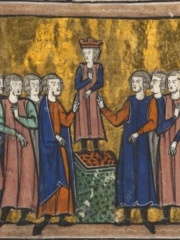
10. Baldwin V of Jerusalem (1177 - 1186)
With an HPI of 78.73, Baldwin V of Jerusalem is the 10th most famous Israeli Politician. His biography has been translated into 31 different languages.
Baldwin V (born 1177 or 1178; died 1186) reigned as the king of Jerusalem together with his uncle Baldwin IV from 1183 until his uncle's death in 1185, after which he was sole king until his own death in 1186. Baldwin IV's leprosy meant that he could not have children, and so he spent his reign grooming various relatives to succeed him. Finally his nephew was chosen, and Baldwin IV had him crowned as co-king in order to sideline the child's unpopular stepfather, Guy of Lusignan. When Baldwin IV died, Count Raymond III of Tripoli assumed government on behalf of the child king. Baldwin V died of unknown causes and was succeeded by his mother, Sibylla, who then made Guy king.
People
Pantheon has 129 people classified as Israeli politicians born between 2400 BC and 1987. Of these 129, 57 (44.19%) of them are still alive today. The most famous living Israeli politicians include Benjamin Netanyahu, Mahmoud Abbas, and Ehud Olmert. The most famous deceased Israeli politicians include Herod the Great, Baldwin IV of Jerusalem, and Ariel Sharon. As of April 2024, 10 new Israeli politicians have been added to Pantheon including Moshe Lion, Michael Ben-Ari, and Moshe Feiglin.
Living Israeli Politicians
Go to all RankingsBenjamin Netanyahu
1949 - Present
HPI: 82.66
Mahmoud Abbas
1935 - Present
HPI: 79.90
Ehud Olmert
1945 - Present
HPI: 73.70
Ehud Barak
1942 - Present
HPI: 73.69
Reuven Rivlin
1939 - Present
HPI: 73.43
Isaac Herzog
1960 - Present
HPI: 71.02
Yoav Galant
1958 - Present
HPI: 69.99
Israel Katz
1955 - Present
HPI: 69.39
Tzipi Livni
1958 - Present
HPI: 67.06
Yair Lapid
1963 - Present
HPI: 66.66
Naftali Bennett
1972 - Present
HPI: 64.07
Benny Gantz
1959 - Present
HPI: 63.75
Deceased Israeli Politicians
Go to all RankingsHerod the Great
73 BC - 3 BC
HPI: 84.23
Baldwin IV of Jerusalem
1161 - 1185
HPI: 83.71
Ariel Sharon
1928 - 2014
HPI: 80.78
Yitzhak Rabin
1922 - 1995
HPI: 80.27
Amalric of Jerusalem
1136 - 1174
HPI: 79.76
Amin al-Husseini
1895 - 1974
HPI: 79.22
Herod Antipas
20 BC - 39
HPI: 78.77
Baldwin V of Jerusalem
1177 - 1186
HPI: 78.73
Sibylla, Queen of Jerusalem
1160 - 1190
HPI: 78.66
Moshe Dayan
1915 - 1981
HPI: 78.14
Rehoboam
972 BC - 914 BC
HPI: 77.75
Jeroboam
1000 BC - 910 BC
HPI: 76.22
Newly Added Israeli Politicians (2025)
Go to all RankingsMoshe Lion
1961 - Present
HPI: 56.10
Michael Ben-Ari
1963 - Present
HPI: 52.42
Moshe Feiglin
1962 - Present
HPI: 51.40
Einat Kalisch-Rotem
1970 - Present
HPI: 46.27
Mansour Abbas
1974 - Present
HPI: 46.09
Ilan Shor
1987 - Present
HPI: 44.78
Danny Danon
1971 - Present
HPI: 44.67
Karine Elharrar
1977 - Present
HPI: 43.56
Michal Rozin
1969 - Present
HPI: 42.41
Stav Shaffir
1985 - Present
HPI: 38.53
Overlapping Lives
Which Politicians were alive at the same time? This visualization shows the lifespans of the 25 most globally memorable Politicians since 1700.


